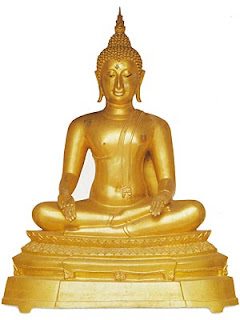About
Gautama Buddha, also known as Siddhārtha Gautama (The Enlightened One) was born as a Kshatriya (constituted the ruling and military elite), the son of Śuddhodana, "an elected chief of the Shakya clan", whose capital was Kapilavastu, and who were later annexed by the growing Kingdom of Kosala during the Buddha's lifetime. Gautama was the family name. His mother, Maya (Māyādevī), Suddhodana's wife, was a Koliyan princess. Legend has it that, on the night Siddhartha was conceived, Queen Maya dreamt that a white elephant with six white tusks entered her right side, and ten months later Siddhartha was born. As was the Shakya tradition, when his mother Queen Maya became pregnant, she left Kapilavastu for her father's kingdom to give birth. However, her son is said to have been born on the way, at Lumbini, in a garden beneath a sal tree.
The day of the Buddha's birth is widely celebrated in Theravada countries as Vesak. Buddha's Birthday is called Buddha Purnima in Nepal, Bangladesh, and India as he is believed to have been born on a full moon day. Various sources hold that the Buddha's mother died at his birth, a few days or seven days later. The infant was given the name Siddhartha (Pāli: Siddhattha), meaning "he who achieves his aim". During the birth celebrations, the hermit seer Asita journeyed from his mountain abode and announced that the child would either become a great king (chakravartin) or a great sadhu. By traditional account, this occurred after Siddhartha placed his feet in Asita's hair and Asita examined the birthmarks. Suddhodana held a naming ceremony on the fifth day and invited eight Brahmin scholars to read the future. All gave a dual prediction that the baby would either become a great king or a great holy man. Kondañña, the youngest, and later to be the first arhat other than the Buddha, was reputed to be the only one who unequivocally predicted that Siddhartha would become a Buddha.
While later tradition and legend characterized Śuddhodana as a hereditary monarch, the descendant of the Suryavansha (Solar dynasty) of Ikṣvāku (Pāli: Okkāka), many scholars think that Śuddhodana was the elected chief of a tribal confederacy.
Early texts suggest that Gautama was not familiar with the dominant religious teachings of his time until he left on his religious quest, which is said to have been motivated by existential concern for the human condition. The state of the Shakya clan was not a monarchy and seems to have been structured either as an oligarchy or as a form of republic. The more egalitarian gana-sangha form of government, as a political alternative to the strongly hierarchical kingdoms, may have influenced the development of the śramanic Jain and Buddhist sanghas, where monarchies tended toward Vedic Brahmanism.



